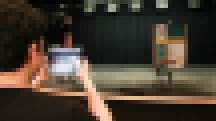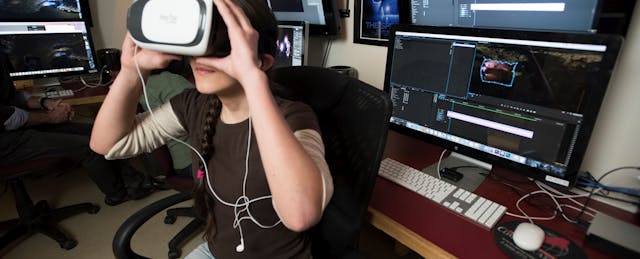There are plenty of digital gadgets that can make users feel as though they’re being transported through time and space. But the sensation of being immersed in another era or a different realm is much older than today’s VR headsets.
The origins of the experience may come from an ancient artform: theater.
“As a set designer, I would think about experiences that are recreating augmented reality, essentially,” says Brave Williams, an associate professor at Husson University in Maine. “It is an augmentation of reality that has been done for thousands of years.”
Now, Williams is helping his institution push the boundaries of Shakespeare’s famous line that “all the world’s a stage.”
The professor has drawn on his experiences designing scenery for venues like the Alabama Shakespeare Festival and teaching set design to college students to help Husson launch a new bachelor’s degree program in extended reality. It’s one of the first, putting the institution in the company of Drexel University and the Savannah College of Art and Design.
The seed for the degree program was planted in 2016, when Husson received an anonymous $1 million donation to support the study and instruction of virtual reality. The gift led to the creation of the iEX Center on campus, a hub for extended reality research and learning.
At the time, Williams was already integrating interactive media into his set design courses. But the donation inspired him to dig deeper into extended reality, which he defines as media that is registered in 3D space, interactive in real time and combines real and virtual elements.
“I’ve been researching, going to conferences—sucking in everything I could, reading everything I could, watching everyone I could,” says Williams, who is now the director of the iEX Center.
To expand the center’s reach, university leaders decided to build extended reality into the college curriculum. One example was the development of AR Stagecraft, an app that translates student set designs into an immersive experience of what the scenery would look and feel like if built on an empty stage.

In fall of 2018, Husson began to develop a series of courses in extended reality. One is an introductory course that is now available online and is being used by high school students. Then the university started a multiple-course certificate program designed for professionals who may be interested in incorporating XR in their work. Now, the full degree program will combine classes in math, coding, communications and design and draw on tools including iPads, projectors and VR goggles.
The goal of creating programs with differing levels of intensity is to offer what Williams calls “seamless extended reality for everyone.”
“The [extended reality] industry is moving very fast but very few people have been able to keep up with understanding it and applying it in a useful way. That’s a real, big problem,” Williams says. “We are creating students that can go into a school district and help them, or go into a company and help them understand it’s not as hard as they think.”


